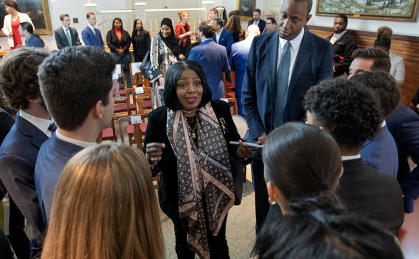Rutgers Students Assist With Governor’s Bipartisan-Backed Clemency Project

Students have been reviewing cases and writing reports to help the state address a backlog of more than 1,000 applicants
In a formal dining room at Wood Lawn Mansion, a group of Rutgers-New Brunswick students are hunched over stacks of criminal cases – 60 petitions from current and formally incarcerated New Jerseyans seeking clemency.
“It’s like we set up a mini law firm here,” said their instructor, former assistant U.S. attorney, and Rutgers alumnus Elie Honig, who studied at the Eagleton Institute of Politics as an undergraduate. “We have a secure storage facility for the files. Some cases can be 10 to 20 pieces of paper, and some are 6-inches thick.”
When Gov. Phil Murphy launched his bipartisan-backed Clemency Initiative in June 2024 to expedite pardons and commutations for criminal offenders, Honig saw an opportunity to benefit Rutgers students, the state and a backlog of more than 1,000 applicants. He reached out to his former mentee and current chair of Murphy’s Clemency Advisory Board, Justin Dews, with a proposition.
“I told him, ‘I think we could have a mutual opportunity here. I assume you have to go through a ton of cases, and I think I can tap into some very talented students who can help,’” said Honig, who teaches at Eagleton and is also CNN’s senior legal analyst. “It’s a great example of a partnership with the governor’s office and the State University of New Jersey.”
Once a week, the 14 students in Honig’s New Jersey Clemency Internship gather at Eagleton – seated around polished dining tables between an ornate fireplace and China-lined cabinets – to sift through sometimes-decade-old convictions and build summations of each applicant’s petition for clemency.
“We are one cog in this really big machine,” said junior Ayush Nimak, 20, a computer science major and economics minor. “It’s been great to see how our work effects change.”

On Tuesday, Gov. Murphy came to Rutgers-New Brunswick to announce a second round of clemency actions, including 87 pardons and six commutations – bringing the total number of clemency grants during his administration to 129 individuals.
Honig and his students were in attendance during the announcement at Winants Hall when Murphy and Rutgers President Jonathan Holloway each commended them for their efforts on the project.
So far this semester, the students have compiled and sent 40 summations to Trenton. Each one helps Gov. Murphy’s team determine which applicants deserve a second chance, and which do not.
“We are not giving a thumbs up or thumbs down recommendations to the governor,” said Honig of his students’ involvement in the clemency process, which will be expanded to continue in the summer 2025 and fall 2025 semesters.
What they are doing is boiling down years of case files to craft easily digestible two- to three-page memos that outline the totality of each case’s circumstances for the governor’s consideration. Relevant memo information includes the seriousness of the offense, the applicants overall criminal history, time passed since the offense, the offender’s age, any substance issues and rehabilitation, acceptance of responsibility, and any letters of support or opposition from community or prosecutors.
“These students are learning their way around a real criminal file and picking up the terminology – What a rap sheet looks like. What a police report looks like. What a prosecutor’s filing looks like,” Honig said. “A lot of them may end up being lawyers, and this is the first time they’ve had the chance to have their hands on a project with substantial real-world impacts.”
The students, selected from a field of more than 300 applicants for this 1.5 credit independent study, initially met with Honig for several sessions, one of which included two attorneys from the governor’s office, to review the pardon process before digging into the files on their own.
“Nothing would have been possible without Professor Honig’s guidance and support,” Nimak said. “He’s been the backbone for this project, even though he gives us so much freedom and liberty.”

Several students in the course who are planning to attend law school, including junior Summer Roberts, 20, said the class has given her a clear sense of how much the criminal justice system in New Jersey has changed over the last several decades.
“This is a really good opportunity to reevaluate all the decisions that were made before our time,” said the political science major. “A lot of the sentences we are going over now were made by bygone attorneys and judges, and since retired, arrests made by police no longer on the force. We are entering a new era of sentencing and general reform in the criminal justice system. It’s a wonderful opportunity to examine how we did things in the old days and how our values have changed.”
The experience has made junior Arjan Aiden, 20, empathetic to the circumstances that led to many of these applicants’ convictions.
“You feel more understanding for people as you can contextualize their situations. They either grew up in broken homes or areas quite poor so they had to resort to things that were against laws to survive,” said Aiden, a finance major who is minoring in political science. “You realize the weight of what we are doing. We are taking everything into account and leaving bias by the door.”
To that end, most of the cases sophomore Chaka Mishoe, 20, has worked on stem from charges against domestic abuse survivors and victims of substance abuse.
“I think there’s less of a stigma surrounding crimes stemming from addiction and domestic violence, especially for the victim,” he said, noting many of the governor’s commutations to date have gone to those battling similar issues. “It has been rewarding to work on a profound program that gives people a second chance.”


